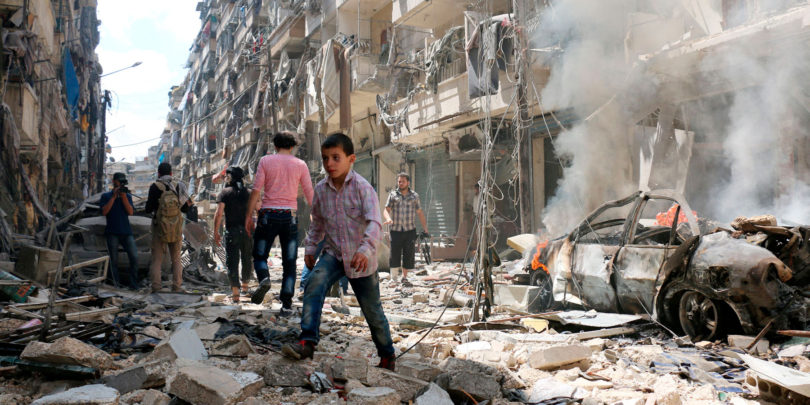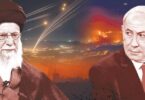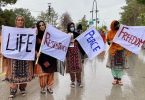By Lal Khan
After more than four years the Syrian government forces under Bashaar al-Assad finally recaptured Aleppo from the rebel forces armed, sponsored and supported by the US and European imperialists and their reactionary monarchies of the Middle East. On Tuesday Syrian government forces took control of Aleppo’s historic Old City after rebel fighters withdrew in the face of army advances overnight. The BBC reported, “Syrian rebels have left the last areas they held in Aleppo’s old city. State media confirmed the military had taken over the whole of the old city.”
The UK-based Syrian Observatory for Human Rights said rebels had withdrawn from the Old City overnight after the army seized the neighbouring districts of Bab al-Hadid and Aqyul. Rebels were forced to withdraw from the Old City neighbourhoods of Aleppo for fear of being besieged. The army has made steady gains since it began its latest push to recapture east Aleppo. It now controls all the areas, east of the historic citadel, and parts of the Marjeh neighbourhood. However Syrian state news agency Sana reported that several Israeli missiles struck the Mazzeh military airbase outside the capital Damascus overnight almost in the same hours as the Syrian Army was recapturing Aleppo. Syria’s Assad-led regime ruled out any further truces in Aleppo, and on Monday Russia and China vetoed a UN Security Council resolution on a weeklong ceasefire. Kremlin spokesman Dmitry Peskov described all the remaining rebels in eastern Aleppo as “terrorists,” saying that they had united around the jihadist group formerly known as al-Nusra Front.
With Assad’s victory fortunes of the civil war in Syria seem to be turning in favour of the incumbent regime in Syria. Now the western and regional despotic regimes that supported these vicious Islamicist terror groups are crying foul. After a meeting in Paris on Saturday John Kerry, the US secretary of state, and European foreign ministers, as well as their counterparts from Qatar and Saudi Arabia, demanded that Syrian government and Russian forces stop their onslaught. Kerry called the Syrian government’s “indiscriminate bombing” of eastern Aleppo amount to “war crimes” and “crimes against humanity”. However, when Islamic and secular terrorists supported by the western imperialism and these reactionary monarchies were committing heinous crimes and massacres of the ordinary civilians in Syria, Kerry never used these words of condemnation in his statements at these atrocities. He went on to say, “Russia and Assad have a moment where they are in a dominant position to show a little grace.”
Qatar’s filthily opulent and reactionary monarchical dynasty that was foremost in backing financially and militarily these virulent Islamicists executing harrowing terrorism and spilling innocent blood, was also now in a mood of condemnation and finding ‘a political solution’. Mohammed bin Abdurrahman Al Thani, Qatar’s foreign minister, accused the Syrian government of “genocide” and urged the “international community” to remain focused on finding a “political solution” to the conflict. In another reversal of policy Jean-Marc Ayrault, France’s foreign minister said the Syrian opposition was willing to resume negotiations with Bashar al-Assad’s government “without preconditions”. Not so long ago the French imperialists were the most aggressive of European imperialists as Syria had been occupied and colonised after the First World War by them. They had never accepted the Assad regime what to say of negotiating with them. According to Aljazeera, “The UN said on Friday, it had received reports of fighters blocking some from leaving and of reprisals against residents who asked armed groups to leave.” This is another illustration of the ‘humanitarian character’ of the so-called ‘rebels’.
In September 2015, Russian military intervention in Syria marked a critical change in the course of Syria’s protracted and bloodied civil war. During the cold War era, Moscow had long-standing close relations with Damascus. Putin’s decision to boost Russian military, political, and diplomatic support to Damascus played a key role in reinvigorate and strengthen the depleted Syrian forces under grinding pressure from an array of opposition forces comprising of vicious Islamic bigots, sponsored by reactionary regimes such as Kuwait, Saudi Arabia, Qatar and UAE, to the so-called liberal and secular imperialist stooges masquerading as democrats but hands in glove with the religious fanatic murderers.
But Putin is no Lenin. There is not the slightest inclination of any revolutionary intent. The aims of the Russian intervention were not for the salvation of the Syria’s oppressed but their own narrow nationalist agenda that Putin is now pursuing more vigorously. His motives are driven equally by domestic and foreign vested interests. Russian proclamation of stopping the Islamic State (IS) from taking over the Syrian capital is only partially correct. The threat posed by Islamic extremists is very real but strengthening Bashaar al-Assad was a calculated and strategic move by Moscow. Russia now has morphed into a leading player in Syria’s bloody war game that continues to reverberate throughout the Middle East and beyond.
Russia’s assets in Syria centre on its port at Tartus, its only seaport along the Mediterranean, as well as Khmeimim air base its only airfield in the Middle East. In October, Russia’s parliament ratified an agreement to approve the base that exposed an earlier secret pact to give Russian military carte blanche to move personnel and cargo in and out of Syria, without inspection or interruption by local authorities. In 2016 more troops and advanced missile systems, have been moved to the war-ravaged Syria. Russia and its Syrian ally cast their alliance as the winning team in the fight against IS. After the recapture of the ancient city of Palmyra last March, the Russians built a military base in the city.
To hype the nationalist fervour amongst the deprived masses in Russia, Putin is whipping up Russian nationalism and attempting to redraw the external frontiers and exploit conflicts in Ukraine and beyond for domestic consumption and international bargaining chips. Russia and Iran, for the time being, are on the same side in this war. Iran’s Mullah aristocracy’s interests domestically and regionally are not much different from the Russia’s Mafiosi elite, preserving its land corridor and access to Hezbollah in neighbouring Lebanon, influencing Shia populations in the Levant, and consolidating its growing geopolitical sway across the region in enmity and at the expense Saudi Arabia.
Syria’s president Bashaar Al-Assad is a shrewd operator and for his regimes vested interests plays his foreign friends off each other. When Putin abruptly announced last March that he was pulling out “the main part” of Russian forces in Syria, Assad tilted towards Iran to fill any vacuum and defy Moscow. Speculations have been rife whether Assad’s these vital allies would eventually try to nudge him aside. However, it seems that for now, it suits them to keep him in charge. With US President-elect Donald Trump’s ambiguous and confusing position on Syria and his hints of joining in the campaign with Putin, at least in the fight against IS and the al- Nusra Front linked with al- Qaeda the situation has become more complicated for the strategists of western particularly the European imperialists. Assad has already dubbed Mr Trump as a “natural ally”. But the hurry in the push for Aleppo to vanquish it before Trump takes the oath of office reveals the anxiety and doubts that Assad has about the Trump presidency.
Although the fall of Aleppo to the Assad forces is a serious setback for the western imperialists and gulf monarchies but this in no way signifies the end of the atrocious war or a breakthrough for peace. Bashaar al-Assad himself accepted the lengthy and protracted ordeal that Syria faces. “It’s true that Aleppo will be a win for us, but let’s be realistic – it won’t mean the end of the war in Syria,” Assad told the al-Watan newspaper. “But it will be a huge step towards this end.” After the fall of Aleppo, the geography and fragmentation of the country into competing areas of control by different groups would not be sustainable. Pockets of rebel control areas would perhaps persist but chances of diverse rebel groupings regaining lost territory or annexing new areas are minimal in the short term. It seems that the collapse of the armed opposition in Aleppo has removed the major military threats to regime’s geographical gains.
After the death of Assad father, Hafiz al-Assad in 2000 the process of dismantling the planned economy in Syria accelerated. Sectors of the economy such as the transport of oil began to be privatised, state subsidies on utilities etc. slashed and capitalism’s restoration process was started in Syria. The state’s stance towards the economy went from almost total control to interventionist. Assad was trying to ape the Chinese model, whose high economic growth rates under one-party rule held strong appeal for repressive regimes like Assad’s. The state began to pull back and allowed the private sector to replace its role in the economy and services. This created hardships and deprivation for the ordinary Syrians. Ultimately the masses rose up against the Bashaar Al-Assad regime coinciding with the Arab uprising in 2011 while the reversal of economy to capitalism was still in its initial stages. With the reactionary religious forces snatching the movement’s top echelons’ and the ferocious repression of the state morphed it into a vicious civil war. The rise of the Islamic State and other fundamentalists’ groupings has made this conflagration so grisly. The US imperialists in their blind hatred and enmity against the Assad regime covertly and overtly supported bestial Islamicists.
The Gulf States and other reactionary Arab regimes had their historic, diplomatic, ideological, social, cultural and economic conflicts with the Syrian regime. Their financing of the cruel Islamic terrorist groupings exacerbated the bloodshed and violence. These interventions are not going to stop nor the Assad regime can fully exert its writ on the whole of Syria. From Iraq to Yemen the states are collapsing and the societies are being ripped apart by fundamentalist terror and imperialist aggression.
The worsening socioeconomic conditions throughout the Arab societies are creating new contradictions that will explode in the coming period. The Arab Human Development Report for 2016 launched at the American University of Beirut in late November by the United Nations Development Programme brings out this deteriorating situation in the Middle East. Fifteen years ago, when the first Arab Human Development Report was published, five out of 22 Arab states were witnessing conflict or political violence. Today, this number has gone up to 11. According to the report the region has seen low economic growth with very little job creation, which has translated into a general decline in the standards of living for the majority of Arab citizens.
The report says, “With more than 75 percent of the Arab population living in major cities in the region, under degraded living conditions, shrinking public spaces and the general malaise of a majority of the population. Young people in the region are the main victims of this grim situation. They constitute the largest segment of society – 105 million are aged 15-29, 30 percent of the Arab region’s population – and suffer from pervasive social exclusion. Unemployment among youths is the highest in the world at more than 30 percent.”
The Report also revealed that an overwhelming majority of youth rejects terrorism and religious fanaticism, although conservative social attitudes are eminent at the present moment in time. The report concludes, “Arab countries are witnessing a widening divide between the “haves” and the “have-nots”, and young Arabs living in slums and peripheral areas have fewer chances of obtaining a quality education and access to affordable health services.” These are recipes for a renewed class conflict erupting in the region. Negotiated settlements, ‘political solutions’ violence and wars, with imperialist aggression and fundamentalist terror cannot resolve anything. Under the present capitalist system, the mayhem and conflagration can only exacerbate. Now the fate of Syria’s beleaguered masses is once again linked to that of the rest of the region’s oppressed inhabitants. After a hundred years, history has come full circle but on a higher plane.
The conflict and crisis have bypassed the boundaries carved out by the imperialists after the First World War. Now the fate of the peoples of the Middle East is linked more closely than ever before. Inspite of the defeat of the 2011 uprising and the present bloody quagmire that has convulsed the region a new uprising is bound to erupt. Such a movement and be victorious only by overcoming the divisions and the prejudices of religion, sect, nationality, creed and race. It can only be united on a class basis. Such a class struggle where the toiling classes from Israel to the Arabian Peninsula in a collective fight for their socioeconomic transformation can lead the way. The victory of such a revolutionary movement with a Marxist leadership can emancipate the masses of this historic region from misery, oppression, wars and bloodshed. It shall become a united Socialist Federation of the Middle East. A beacon of hope and revolution for the oppressed masses across the planet.






